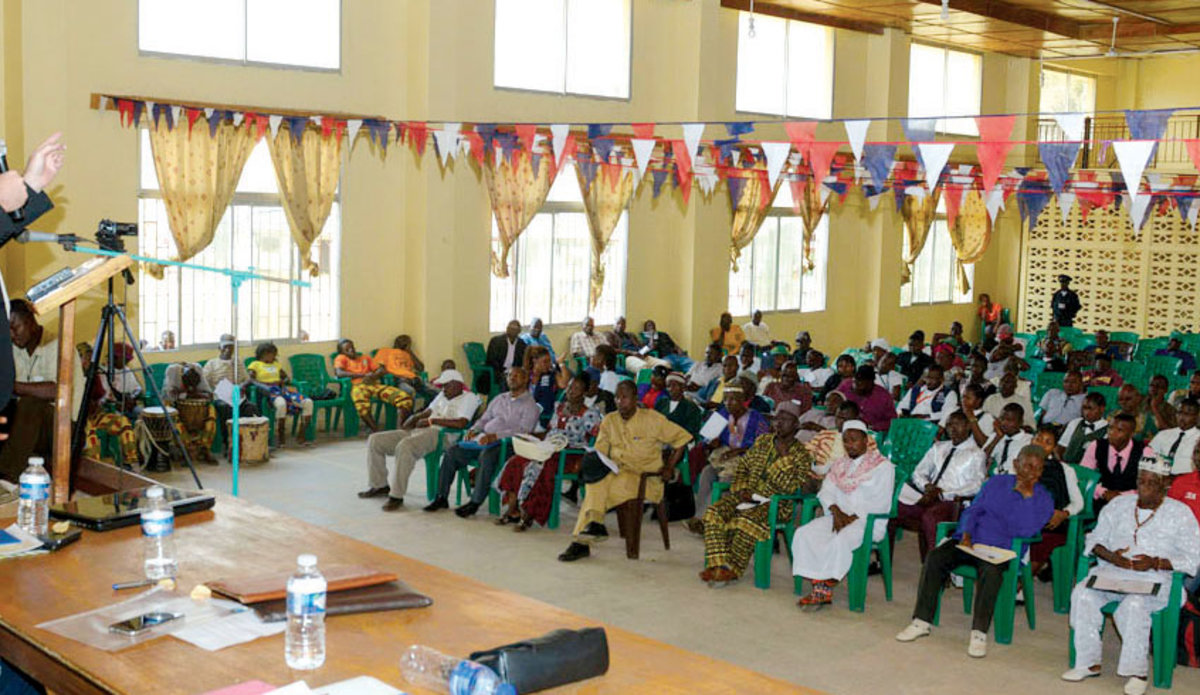UNMIL Ready to Support Government through Security Transition
Liberia is set to assume responsibility for all aspects of national security by June 30, 2016 taking over the residual tasks performed by the United Nations Mission in Liberia (UNMIL). UNMIL is supporting the government to strengthen its security capacities and processes fundamental to long-term peace and stability, including security sector reforms and national reconciliation.
“Liberia’s job, with support from UNMIL and many other partners, is to deliver on the priorities over the remaining days,” said Deputy Special Representative of the Secretary-General (DSRSG) for Rule of Law Waldemar Vrey at a press briefing on the security transition in November at the Ministry of Information, Culture and Tourism. “This will require sustained commitment until the finish line.”
The UN Security Council in April 2015 authorized the resumption of UNMIL’s drawdown, suspended since September 2014 due to the Ebola outbreak, and requested the Secretary-General to continue to streamline the mission’s civilian, police and military components and to consolidate its presence in line with the security transition.
“The UNMIL drawdown is nothing new. The mission’s uniformed presence, which once numbered 17,000 military and police personnel, has been reduced by about 12,000 over the past decade – yet no significant security incidents have taken place in areas from where we have withdrawn,” said the DSRSG.
Vrey expressed confidence over commitment of the Government of Liberia to put in place the necessary structures and mechanisms to effectively take over security responsibilities from UNMIL come June 2016.
“The good news is that Liberian government, at the highest levels and across ministries, is fully committed to the comprehensive security transition plan,” he said.
“I want to reaffirm to you today that Liberia indeed has the potential to maintain internal peace and security,” Justice Minister Benedict F. Sannoh confirmed. “We have disaggregated the UNMIL plan and identified all the activities that UNMIL is now engaged in, as key priority areas that we must take over come June 30, 2016.
“What the UN Security Council has called upon the government to do is to fill in the gaps that will be created when UNMIL leaves. This is not a totally new responsibility that this government has not handled,” said the minister. “Direct responsibility for peace and security has actually been in the hands of the Liberian security forces, with UNMIL providing mentoring, training, and direct support or intervention only when required.”
DSRSG Vrey said that the security institutions do not operate in a vacuum; therefore they need the support, cooperation and goodwill of communities to effectively serve and protect.
“Security is every community’s responsibility. Every Liberian has a role to play to help the Government provide a safe and secure environment that we all want to see. We saw this great potential during the Ebola response. When communities were given the resources and decision-making authority, Liberia united to beat back Ebola” he pointed out.
Minister Sannoh revealed that the government is focusing on three tracks, namely, operational effectiveness, which requires training of officers, deployment of officers throughout these counties; institutional strengthening, to ensure that appropriate legal framework, policies, and regulatory frameworks are in place and that appropriate institutional arrangements and structural reforms are put in place; and working effectively with the communities at all levels through community partnerships, country and district security committees, and close collaboration with the local leadership to overcome challenges in the counties and assume control over activities initially undertaken by UNMIL.
“We must strengthen the capacity of the relevant security agencies, provide the appropriate support, and work closely with local people, and collectively as with county elders, chiefs, superintendents and elected representatives,” said Minister Sannoh.
The DSRSG cleared up misunderstandings about the UNMIL drawdown that had some Liberians apprehensive about security.
“Any decision about UNMIL’s eventual departure or a follow-on mission will be made by the Security Council towards the end of 2016. “Come 1 July 2016, UNMIL will still have 1,240 military and 606 police on the ground. These forces would only be used in a very extreme situation – one that threatened a strategic reversal of the great progress Liberia and its Partners have made over the past 12 years.
“Even after the eventual withdrawal of UNMIL, the UN County Team will continue to support processes that are fundamental to long-term peace and security,”noted Vrey.
 UN
UN United Nations Peacekeeping
United Nations Peacekeeping





